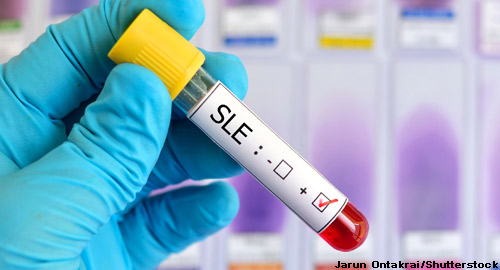 Studies of T cells from patients with systemic lupus erythematosus (SLE) have shown the downregulated expression of the CD3ζ chain, as well as the increased production of IFN-ɣ. Moreover, research has revealed that FcԑRIɣ replaces CD3ζ in these T cells, resulting in hyperactivated T cells with a proinflammatory phenotype. Researchers have suggested the downregulation of CD3ζ may be the result of genetic polymorphisms, epigenetic changes, altered transcription and/or increased degradation.
Studies of T cells from patients with systemic lupus erythematosus (SLE) have shown the downregulated expression of the CD3ζ chain, as well as the increased production of IFN-ɣ. Moreover, research has revealed that FcԑRIɣ replaces CD3ζ in these T cells, resulting in hyperactivated T cells with a proinflammatory phenotype. Researchers have suggested the downregulation of CD3ζ may be the result of genetic polymorphisms, epigenetic changes, altered transcription and/or increased degradation.
Attention has turned to the role of CD3ζ in the natural killer (NK) cells of SLE patients. New research has revealed that downregulation of CD3ζ also appears to confer a proinflammatory phenotype to SLE NK cells. Abel Suarez-Fueyo, PhD, a research scientist at Harvard Medical School, Boston, and colleagues propose that the downregulation of CD3ζ contributes to the previously recognized altered function of NK cells in SLE patients. The results of the study were published in the May issue of the Journal of Immunology.1
“As CD3ζ is critical for proper signaling in NK cells, and NK cell dysfunction has been described in SLE patients, we have studied the relationship between CD3ζ levels in NK cells and their function,” write the authors in their discussion. “We found a direct correlation between the levels of CD3ζ and ADCC [antibody-dependent cellular cytotoxicity], a mechanism that depends on CD16, a molecule associated with CD3ζ and FcεRIg, and an inverse correlation with natural cytotoxicity.”
The researchers also note that CD16 is involved in the response to herpes simplex virus, cytomegalovirus and tumor cells. The researchers also suggest this loss of CD3ζ in SLE NK cells and the coincident decrease in CD16 function may also contribute to the increased risk of viral infections in patients with SLE.
Natural cytotoxicity from NK cells depends on several receptors, including NKp30 and NKp46, which signal via CD3ζ or the FcԑRIɣ chain. Both NKp30 and NKp46 play a significant role in natural cytotoxicity and are more dependent on FCԑRIɣ than CD3ζ. Moreover, previous research showed human NK cells deficient in FcԑRIɣ have increased ADCC, reduced natural cytotoxicity and reduced cytokine production. Thus, CD3ζ seems to be important for CD16 signaling, whereas natural cytotoxicity relies on FCԑRIɣ.
The investigators also note the downregulated expression of CD3ζ did not extend to NKT cells. “In this study, we found decreased CD3ζ levels in NK cells and T cells from SLE patients, but not in NKT type I cells,” write the authors. “This can occur as a consequence of common mechanisms affecting NK and T cells, but not NKT type I; however, additional factors can contribute to this discrepancy, including cohort bias and treatment. Nonetheless, we did not find any relation between patients’ therapy and CD3ζ levels.” In other words, the decreased levels of CD3ζ in the NK cells of SLE patients were independent of disease status or treatment.